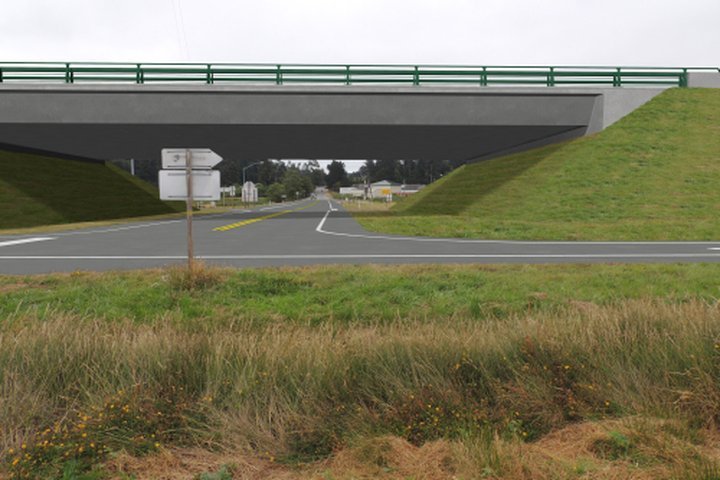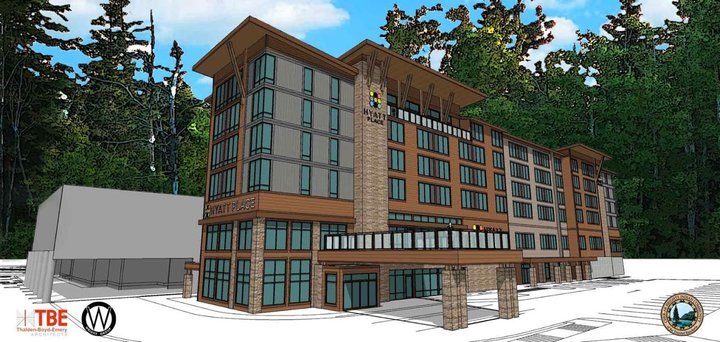
Mock-up of proposed interchange, or “undercrossing,” at Indianola Cutoff. | Caltrans.
# # #
A collection of controversial issues affecting Humboldt County will be considered at this week’s California Coastal Commission meeting, including Caltrans’ long-gestating Eureka-Arcata Corridor Improvement Project, the Trinidad Rancheria’s proposed hotel development, and changes to the county’s cannabis rules.
It’s convenient, then, that the meeting will be held at Eureka’s Wharfinger Building (1 Marina Way) this Wednesday, Thursday and Friday. (The monthly meetings take place up and down the state; last month’s, for example, was held in San Luis Obispo.)
Caltrans has been pursuing a redesign of the six-mile “safety corridor” between Arcata and Eureka for more than a decade now. The current plan calls for construction of an “undercrossing” interchange at the Indianola cutoff (as pictured above); a “half signal” to control northbound traffic at Airport Road; extended acceleration and deceleration lanes; and closure of all other medians to prevent cross-traffic turns.
Six years ago the Coastal Commission ordered all billboards along the corridor removed “to the extent possible” as a condition of approval. Many have since been taken down, though quite a few remain. The commission also instructed Caltrans to include a Class 1 bicycle trail and sea-level-rise analysis in its design.
The trail has taken great strides since then, with the 2017 completion of the Bay Trail North — from Arcata to Bracut — and funding secured for completion of the Bay Trail South, which will connect the gap between Bracut and the Eureka Waterfront Trail.
While the Coastal Commission’s staff report includes a section addressing sea-level rise, local environmentalists say the proposed mitigation measures are insufficient.
In a letter submitted to the commission, Humboldt Baykeeper and the Surfrider Foundation criticize staff recommendations, which call on CalTrans to develop a sea-level-rise plan by 2030, or within a year of the first time the highway is flooded four times in a 12-month period.
Baykeeper Executive Director Jen Kalt told the Outpost that won’t cut it. “We know sea-level rise is happening, and it will only be a disaster if we fail to plan for it,” she said.

A conceptual drawing of the hotel proposed by the Trinidad Rancheria.
The Trinidad Rancheria’s proposal for a 100-room hotel abutting the Cher-Ae Heights Casino is returning to the Coastal Commission, two months after commissioners objected to the project, with a vote of 6-3, over concerns about the water supply.
The proposed hotel, which has been met with significant public resistance, was originally slated to receive its water via the City of Trinidad, a mile north of the project site. City staff has expressed doubts about whether their municipal supply has enough capacity to meet the hotel’s needs, and they have yet to commit to provide it.
But as the North Coast Journal reported last week, former Humboldt County Supervisor and Coastal Commissioner Ryan Sundberg, a Rancheria member and employee, sent a text late last month to Commission Chair Dayna Bochco announcing that the tribe may have found a new water source.
“Hi, Dayna,” his text began. “[W]e have had [a drilling] rig looking for well water so we don’t have to depend on the City of Trinidad. Today was very exciting, we hit water today and will be able to have well water treated and used for the hotel. Can’t wait to see you all when you come up next Month! Best Ryan.”
Whether this last-minute discovery will prove viable remains to be seen. At Thursday’s hearing the Coastal Commission must again decide whether to object to a determination from the federal Bureau of Indian Affairs (BIA) that the project is consistent with the state’s Coastal Act.
Critics have complained about the visual impacts a five-story hotel atop the bluffs on Scenic Drive, and they’ve called for more opportunities for public input. So you can probably expect some feedback from the public on Thursday.
The commission will also consider a trio of items related to the county’s cannabis regulations. One involves implementation of the county’s Commercial Cannabis Land Use Ordinance in the Coastal Zone. Humboldt County Planning and Building Director John Ford said the commission’s recommended changes to the ordinance have already been reviewed and accepted by both the Planning Commission and the Board of Supervisors.
“It’s not a big deal,” Ford said. “It’s just the culmination of a lot of work getting it to this point.”
The commission will also consider the county’s rules for dispensaries and personal cultivation in the Coastal Zone. The dispensary regulations are pretty much the same along the coast as they are inland, Ford said, except that dispensaries won’t be allowed in industrial zones in the Coastal Zone. Personal cultivation rules are also effectively the same, though Coastal Commission staff specified that weed can only be grown as an accessory use, meaning there must be a residence on the property.
Ford said staff assumed that would be the case, and he expects the hearings for all three items to be smooth sailing.
“These will probably take five minutes,” he said.
It’s safe to assume that the other local matters will require more deliberation. The meeting is scheduled to begin Wednesday at 11 a.m. at the Wharfinger Building and continue through Friday. The full agenda for all three days can be found here.
CLICK TO MANAGE